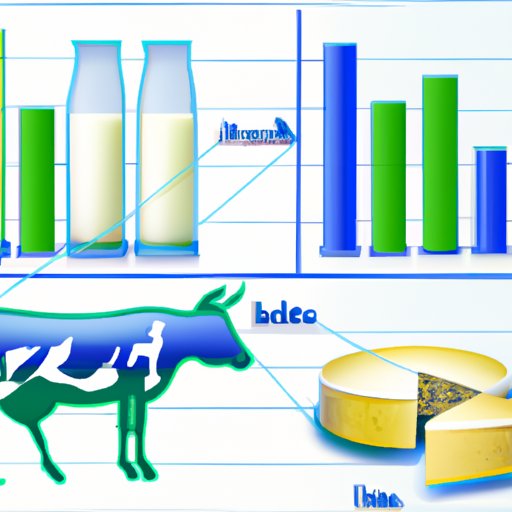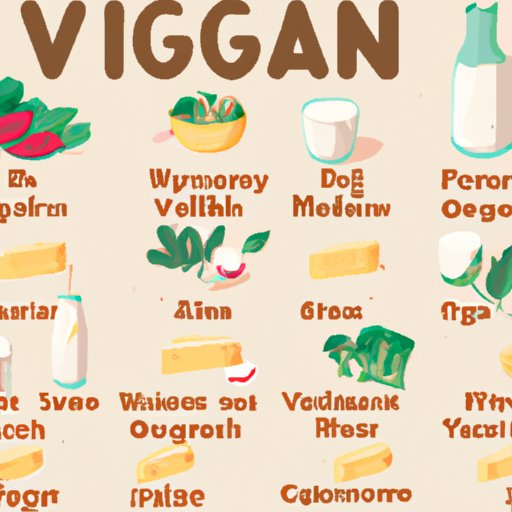Introduction
The debate over whether vegetarians should eat dairy has been ongoing for many years. While some argue that dairy is an essential part of a healthy vegetarian lifestyle, others maintain that it should be avoided due to its potential to cause health problems. In order to make an informed decision about whether or not to include dairy in a vegetarian diet, it is important to understand the pros and cons of dairy consumption for vegetarians.

Overview of Vegetarianism and Dairy Consumption
Vegetarianism is a broad term that encompasses several dietary patterns that exclude or limit the consumption of animal products. There are different types of vegetarian diets, including ovo-lacto vegetarianism (which includes eggs and dairy products) and veganism (which excludes all animal products). Dairy products such as milk, yogurt, cheese, and butter are typically included in ovo-lacto vegetarian diets. However, some vegetarians choose to avoid dairy products due to ethical concerns or personal health preferences.
A Comprehensive Guide to Dairy and Vegetarian Diets
Pros and Cons of Dairy Consumption for Vegetarians
There are both pros and cons to consuming dairy products as part of a vegetarian diet. On the plus side, dairy products provide a variety of nutrients that can be beneficial for vegetarians, such as calcium, protein, and vitamin D. Additionally, dairy products can be a convenient and affordable way to get these nutrients. On the other hand, some people are sensitive to lactose, a type of sugar found in dairy products, which can cause digestive discomfort. Additionally, dairy products are high in saturated fat, which can increase the risk of certain health conditions if consumed in excess.
What Dairy Products Are Suitable for Vegetarians?
When choosing dairy products for a vegetarian diet, it is important to consider both nutrition and ethics. For example, organic dairy products are produced without the use of antibiotics or growth hormones, which may be of concern to some vegetarians. Additionally, some vegetarians may choose to avoid dairy products derived from cows due to ethical concerns. In this case, there are various alternative sources of dairy, such as goat’s milk and sheep’s milk.
Plant-Based Alternatives to Dairy Products for Vegetarian Diets
In addition to traditional dairy products, there are a variety of plant-based alternatives that can provide similar nutrition for vegetarians. Here are some examples of non-dairy milks, yogurts, and cheeses:
Non-Dairy Milks
Soy milk, almond milk, coconut milk, and oat milk are all plant-based alternatives to cow’s milk that can be used in place of dairy. These milks are typically fortified with calcium and other vitamins and minerals, making them a good source of nutrition for vegetarians.
Non-Dairy Yogurts
Coconut yogurt, almond yogurt, and soy yogurt are all vegan-friendly options that can be used in place of traditional dairy yogurt. Many of these yogurts are also fortified with calcium and other vitamins and minerals.
Non-Dairy Cheeses
Nutritional yeast, tofu, and vegetable-based cheeses are some of the most popular vegan-friendly cheese substitutes. These cheeses are often made with nuts, seeds, and/or vegetables, and are usually fortified with calcium and other nutrients.
Is Dairy a Necessary Part of a Healthy Vegetarian Diet?
Benefits of Including Dairy in a Vegetarian Lifestyle
Although dairy is not a necessary part of a vegetarian diet, it can be a beneficial addition for those who choose to include it. Dairy products are a good source of calcium, which is important for bone and dental health. Additionally, dairy products are a good source of protein, which can be difficult to obtain on a vegetarian diet. Finally, dairy products can provide a convenient and affordable way to get these nutrients.
Considerations When Choosing Dairy-Free Options
For those who choose to avoid dairy products, it is important to make sure that they are getting enough nutrition from other sources. Plant-based milk alternatives, such as soy milk and almond milk, are often fortified with calcium and other vitamins and minerals, making them a good choice for vegetarians. Additionally, nutritional yeast, tofu, and vegetable-based cheeses are good sources of protein and other nutrients.
Conclusion
Whether or not to include dairy in a vegetarian diet is a personal decision that should be based on individual preferences and needs. Dairy products can provide a convenient and affordable source of nutrition, but they can also cause digestive discomfort and allergies in some people. For those who choose to avoid dairy, there are plenty of plant-based alternatives that can provide similar nutrition. Ultimately, it is up to each individual to decide what works best for them.
(Note: Is this article not meeting your expectations? Do you have knowledge or insights to share? Unlock new opportunities and expand your reach by joining our authors team. Click Registration to join us and share your expertise with our readers.)
